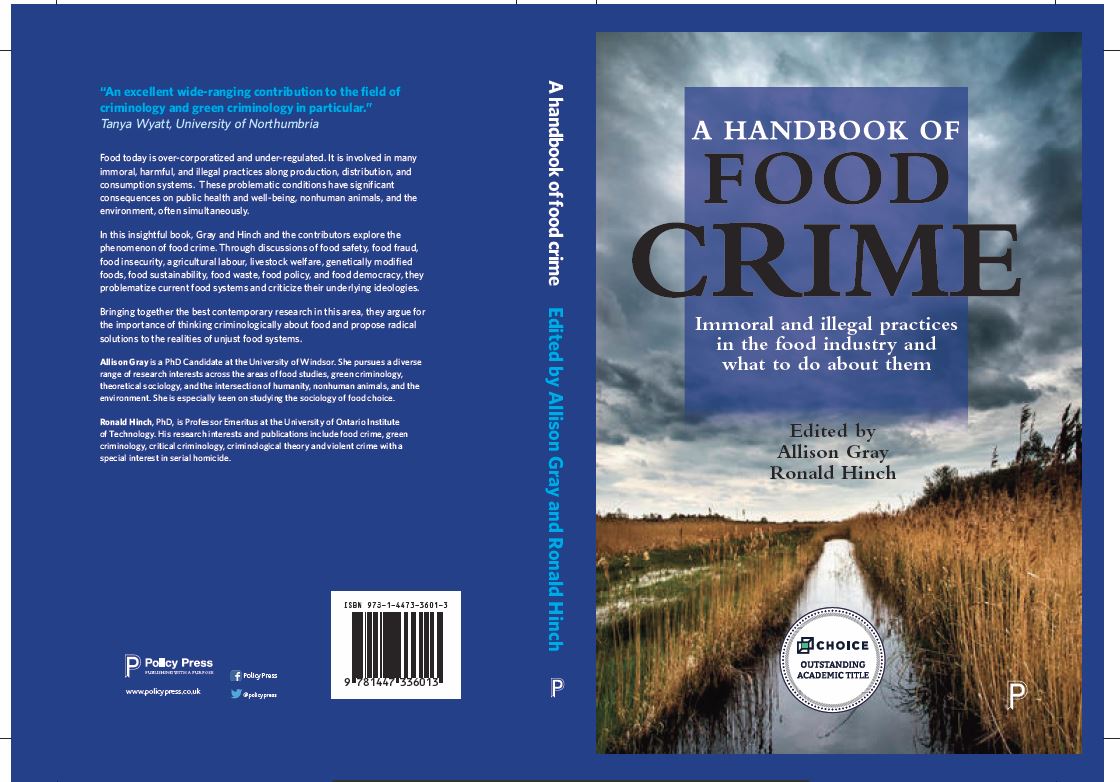Allison Gray's Biography:
Targeting food as a key issue in the nature-culture nexus, Allison Gray's research brings together the perspectives of Green Criminology, Environmental Sociology, Critical Animal Studies, and Food Studies to explore the role of food production and consumption in the lives of human and non-human animals and with the natural environment. As a PhD Candidate in Social Justice at the University of Windsor, Allison's dissertation is studying perceptions of dietary-based environmental harm and the role of plant-meat consumption. Her recent projects and publications include developing the area of food crime, understanding contemporary food activism, exploring the intersection of human and non-human violence, re-conceptualizing food rifts and alienation, and critically analyzing the idea of food choice and food governance. When not reading, Allison can be found playing volleyball and soccer, making a mess in the kitchen, and cuddling her rescue animals.

A handbook of food crime: Immoral and illegal practices in the food industry and what to do about them emerged from the editors’ shared interest in the social and criminal harms associated with the food industry. The concept of food crime originated with a researcher in the UK – Dr. Hazel Croall – and it became the starting point of this handbook’s critical exploration and expansion on a variety of issues involving food crime in today’s world.
Food crime involves the range of systemic harms, injustices, and crimes involving the production, processing, marketing, distribution, consumption, and disposal of food. It includes the use of slave labour in the cocoa industry, deadly salmonella outbreaks, genetic dehorning and the unethical care provided to ‘food animals’, food waste and the impact of food production on climate change. The consequences impact human, animal, and environmental victims, often simultaneously.
Dr. Ron Hinch has long-held an interest in the connections between environmental crime and the food industry. During his years at UOIT, Ron taught undergraduate and graduate courses in this area. Allison Gray undertook her MA: Criminology at UOIT keen to study food from a criminological perspective, and found Ron as a great fit for her supervisor.
Almost immediately we began working together on a project in this area. We decided to prepare a book proposal and we circulated it to a few publishers. We quickly received interest from a publisher but we turned the contract down because this publisher wanted the book to be a series rather than as a single book. We decided we would develop our ideas further and presented conference papers outlining our suggestions for the importance of these issues and how to expand the concept of food crime. One of our papers, presented in Norway, caught the attention of a Norwegian scholar who included the paper in an edited book on green criminology (Gray, A., and Hinch, R. 2015. Agribusiness, government and food crime: A critical perspective, in R. A. Sollund [ed.], Green harms and crimes: Critical criminology in a changing world, pp. 97-116.). Coincidentally, this book was also selected a Choice Outstanding Academic Title award in 2016.
Allison finished her MA as Ron began his retirement, and she began her PhD: Social Justice at the University of Windsor. Then, based on the success of our conference presentation and book chapter, we prepared a new book proposal which we submitted to Policy Press. They expressed interest and in short order a contract was offered and signed. Working with 40 other academic authors from a wide range of backgrounds and expertise, many unfamiliar with the concept of food crime, we were able to successfully produce a single book which unites several different issues and themes within the perspective of food crime.
One of our goals in A handbook of food crime was to draw attention to the social conditions that facilitate food harms and crimes and their consequences. To think criminologically about food, means recognizing that these systemic issues are not mere coincidences or weaknesses of our risk-based society. Nutritiously-poor, unsafe, and fraudulent food, produced through unfair, unjust, and dangerous labour, marketed for profit, distributed unevenly, harming ecological systems, is not normal. It is unacceptable.
It is our hope that this food crime perspective can be part of the sustainable and just food movement that is so urgently required today. Food literally invades and builds our bodies and fuels our social livelihoods. We need to recognize that our intimate consumption practices have global political, social, and criminal connections, so we can give ourselves and our environment a ‘helping fork’.
